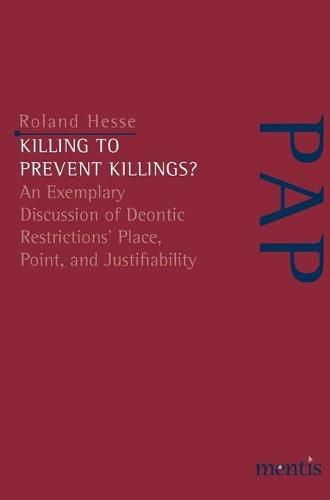Readings Newsletter
Become a Readings Member to make your shopping experience even easier.
Sign in or sign up for free!
You’re not far away from qualifying for FREE standard shipping within Australia
You’ve qualified for FREE standard shipping within Australia
The cart is loading…






Is it permissible to kill an innocent person against her will in order to prevent several other innocent persons from being killed against their will? The answer to which this essay comes after extensive discussion is - under certain conditions and limitations - affirmative. On the way to this answer, the book offers a comprehensive in-depth discussion of so-called deontic restrictions - that is, the idea of an action’s being prohibited in circumstances in which performing it once would be the only way to prevent its being performed multiple times. The book’s leading question is whether there is a plausible rationale for deontic restrictions. To this effect, a taxonomy and critical discussions of the most important approaches to justify deontic restrictions are provided - where many of these approaches undergo a deeper examination for the first time ever. In addition, the book clarifies some adjoining questions, such as why deontic restrictions are often perceived as being problematic or how the concept of agent-relativity should best be understood and formalized. Put into broader perspective, the conclusions offered should have a bearing on a number of debates in normative ethics, not least on the debate between deontologists and consequentialist.
$9.00 standard shipping within Australia
FREE standard shipping within Australia for orders over $100.00
Express & International shipping calculated at checkout
Is it permissible to kill an innocent person against her will in order to prevent several other innocent persons from being killed against their will? The answer to which this essay comes after extensive discussion is - under certain conditions and limitations - affirmative. On the way to this answer, the book offers a comprehensive in-depth discussion of so-called deontic restrictions - that is, the idea of an action’s being prohibited in circumstances in which performing it once would be the only way to prevent its being performed multiple times. The book’s leading question is whether there is a plausible rationale for deontic restrictions. To this effect, a taxonomy and critical discussions of the most important approaches to justify deontic restrictions are provided - where many of these approaches undergo a deeper examination for the first time ever. In addition, the book clarifies some adjoining questions, such as why deontic restrictions are often perceived as being problematic or how the concept of agent-relativity should best be understood and formalized. Put into broader perspective, the conclusions offered should have a bearing on a number of debates in normative ethics, not least on the debate between deontologists and consequentialist.